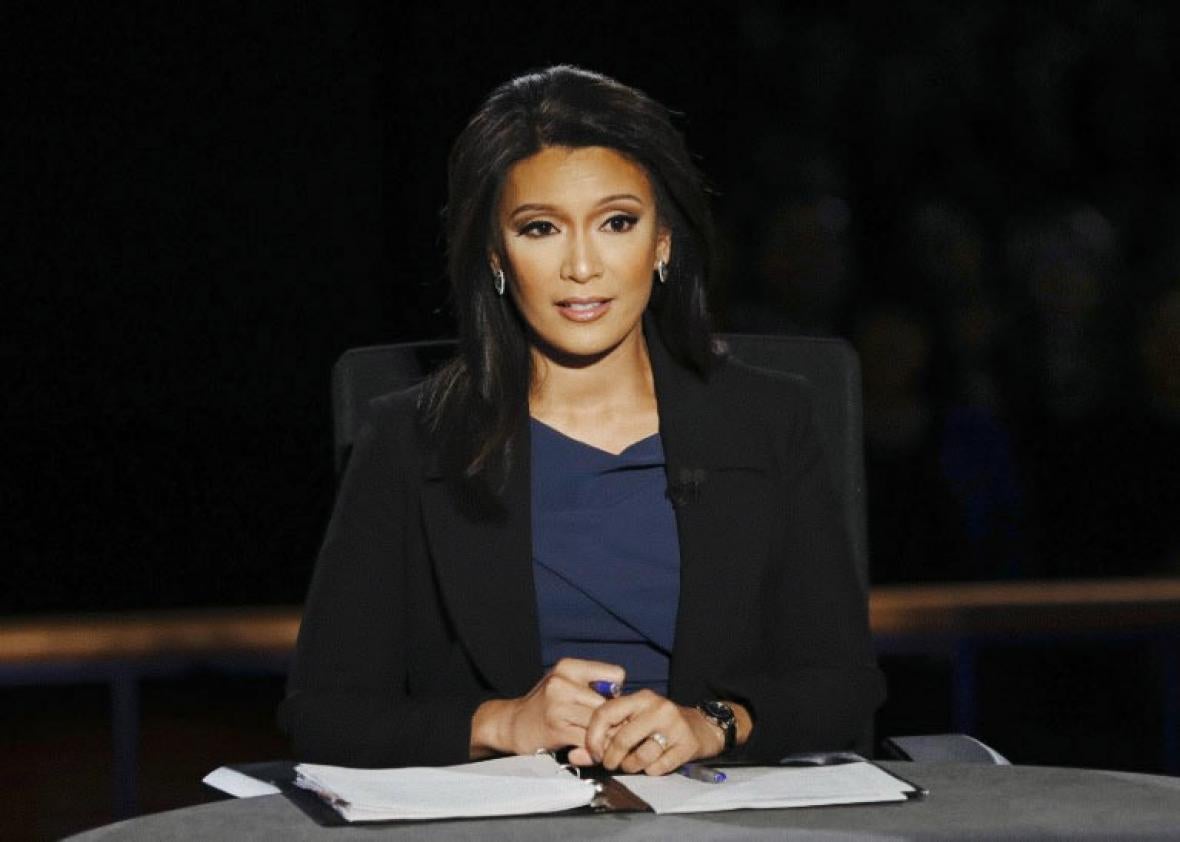A belatedly glorious eight days for the American media ended Tuesday night. After Lester Holt’s altogether excellent moderating job in the first presidential debate last week, and following a number of superb Donald Trump exposés over the past week, CBS News’ Elaine Quijano did a disastrous job of “moderating” the altogether gruesome skirmish between vice presidential candidates Tim Kaine and Mike Pence in Virginia on Tuesday.
Quijano had a tough job, as moderators always do. Mike Pence spent much of the evening refusing to answer direct questions about Donald Trump’s history of bigotry and fraudulence; when he did answer questions on policy, his comments often contradicted whatever Donald Trump says when he deigns to spend more than five seconds discussing actual issues. And Tim Kaine, like a child who couldn’t sit still, kept interrupting and fidgeting; no doubt it is enraging to see your opponent deny one factual thing after another, but Kaine did not come across well. Still, none of this excuses Quijano’s dreadful performance.
Quijano lost control of the debate early on, and never regained it. The candidates were told to speak for a set amount of time, and then discuss the issue at hand more freely with one another. Not only did both candidates, especially Kaine, keep interrupting the initial answers, but Quijano never allowed discussions to flow afterwards, which prevented any sort of productive, or telling, back-and-forth. Just as Kaine and Pence were really getting feisty about Trump’s tax returns, for instance, Quijano put a stop to it so she could ask something on social security. She had a list of questions to plow through, answers be damned.
This occurred a couple of times when Kaine mentioned various despicable things Trump had said—whether about women and minorities, or an American judge from Indiana—and Quijano just flat-out changed the subject. Near the end of the debate, Kaine brought up the meta-subject of Pence’s refusal to answer for his running mate. “Six times tonight I have said to Gov. Pence, I can’t imagine how you can defend your running mate’s position on one issue after the next. In all six cases he’s refused to defend.” Pence’s response? “I’ll take them one at a time.” Then Quijano just merrily moved on to another topic. (It’s hard to say whether this helped Kaine or Pence; it saved Pence from having to give some tricky answers, but it also allowed Kaine’s attacks to go unanswered. Either way, it was an opening to something more intriguing that Quijano either didn’t hear or wouldn’t allow.)
But Quijano’s moderating failure went beyond the way she managed the various discussions. For a moderator so attached to her questions, the questions themselves were terrible. It’s never good for moderators to preface questions with poll numbers, suggesting as it does that the objective reality of something is dependent on what people perceive to be true. Quijano did this twice. When she asked a predictably dreary question about the budget, she seemed to be conflating the issue of balancing state budgets and the federal one. Instead of discussing Hillary’s emails or the Clinton Foundation directly, she asked Kaine, “Why do so many people distrust her? Is it because they have questions about her emails and the Clinton Foundation?” Those are poor questions!
The foreign policy section, which touched on everything from Syria (she asked a specific question about safe zones) to Russia, was refreshingly substantive in comparison. And it certainly wasn’t entirely Quijano’s fault that Tuesday’s event was so hard on the eyes (Pence’s constant head-shaking) and ears (Kaine’s constant interjecting). Nor is it Quijano’s fault that the camera never cut to her, which made her seem even less relevant. But she is to blame for preventing real debate, and for allowing Mike Pence to pretend he isn’t running on a ticket with Donald Trump.
